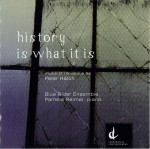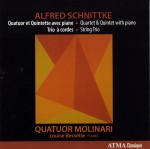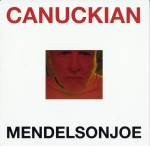 What a wealth of material coming out of the Canadian Music Centre these days! Four solo piano discs have been released in the past two months followed almost immediately by three discs of chamber music. The one I have in hand is history is what it is — music of Peter Hatch performed by the Blue Rider Ensemble (Centrediscs, CMCCD 18413). Kitchener-based Hatch founded NUMUS Concerts in 1985 and the Open Ears Festival of Music and Sound in 1998, both of which continue to flourish. He was composer-in-residence with the Kitchener-Waterloo Symphony from 1999 to 2003, is currently the Arts and Culture Consultant with the Perimeter Institute for Theoretical Physics and a Professor at the Faculty of Music at Wilfrid Laurier University. In addition to these administrative and academic pursuits Hatch has managed to compose an impressive body of work over the past three decades. The current collection encompasses works spanning the past dozen years including pieces written for Toronto’s Continuum Contemporary Music, Vancouver’s Standing Wave Ensemble, Montreal pianist Marc Couroux and a collaborative endeavour — a structured improvisation — with K-W’s Blue Rider Ensemble. Hatch often finds inspiration in literature and two of these works reflect that. Five Memos from 2005 draws on essays of Italo Calvino. The memos have evocative titles such as the first, In Which an Image is Formed, with its darkly lyrical cello line gradually taken over by clarinet, flute and violin. The second, In Which Things Happen Quickly, opens with a vibraphone pattern soon joined in unison by strings and eventually giving way to piano and winds while the percussionist moves to unpitched sounds. The following movements provide contrasting moods and textures ending with a whirlwind and wayward quasi-military march led by snare drum and piccolo (fife?) and the frantic scratching of block chords on the fiddle.
What a wealth of material coming out of the Canadian Music Centre these days! Four solo piano discs have been released in the past two months followed almost immediately by three discs of chamber music. The one I have in hand is history is what it is — music of Peter Hatch performed by the Blue Rider Ensemble (Centrediscs, CMCCD 18413). Kitchener-based Hatch founded NUMUS Concerts in 1985 and the Open Ears Festival of Music and Sound in 1998, both of which continue to flourish. He was composer-in-residence with the Kitchener-Waterloo Symphony from 1999 to 2003, is currently the Arts and Culture Consultant with the Perimeter Institute for Theoretical Physics and a Professor at the Faculty of Music at Wilfrid Laurier University. In addition to these administrative and academic pursuits Hatch has managed to compose an impressive body of work over the past three decades. The current collection encompasses works spanning the past dozen years including pieces written for Toronto’s Continuum Contemporary Music, Vancouver’s Standing Wave Ensemble, Montreal pianist Marc Couroux and a collaborative endeavour — a structured improvisation — with K-W’s Blue Rider Ensemble. Hatch often finds inspiration in literature and two of these works reflect that. Five Memos from 2005 draws on essays of Italo Calvino. The memos have evocative titles such as the first, In Which an Image is Formed, with its darkly lyrical cello line gradually taken over by clarinet, flute and violin. The second, In Which Things Happen Quickly, opens with a vibraphone pattern soon joined in unison by strings and eventually giving way to piano and winds while the percussionist moves to unpitched sounds. The following movements provide contrasting moods and textures ending with a whirlwind and wayward quasi-military march led by snare drum and piccolo (fife?) and the frantic scratching of block chords on the fiddle.
Music is a beautiful disease is an extended one-movement work that starts pianissimo with occasional percussive interjections before a ghostly motif reminiscent of a European police siren, but heard at such a distance as to suggest calm rather than emergency. This haunting fragment is given a variety of instrumental treatments throughout the 18-minute work, eventually heard shared by piano and vibraphone. One Says. History Is. for solo piano was written in 2003. It begins tempestuously in moto perpetuo form alternating sustain pedal drones and staccato passages. After this prolonged fast section the music calms and we hear, in the distance, a recitation of texts from Gertrude Stein’s We Came. A History. At the end of the recitation the piano returns to its former frenzied pace over which we hear a very slow wordless melody sung calmly. The relentless repeated notes eventually give way to a pointillistic denouément for the last three minutes of the first movement. This is followed by another calm section in which the recitation comes to the forefront for several minutes until the piano returns to percussive, although more subdued, textures. The final movement of this nearly half-hour long work is an extended meditation using very few notes.
The disc ends in a beautifully calm mood with the structured improvisation mentioned above, Cantabile, with grace, based, the composer says “on a simple sketch I generated for them.” Throughout the disc the members of the Blue Rider Ensemble — Liselyn Adams, flute; Paul Bendza, clarinet; Jeremy Bell, violin; Paul Pulford, cello; Pamela Reimer, piano and melodica; Beverley Johnston, percussion; Anne-Marie Donovan, voice and melodica — are in fine form.
 Like Peter Hatch’s Music is a beautiful disease, Alfred Schnittke’sPiano Quintet has a haunting theme that recurs and is transformed. We hear it piece-meal in the opening movement but it really takes form in the second, a sort of demented waltz. It eventually returns in a ghostly form in the pastoral finale. The work was begun in 1972 shortly after the sudden death of the composer’s mother, but not completed until 1976, a year after the death of his idol Shostakovich. In 1978 he made an orchestral version of this dark work and called it In memoriam. It is the original version which is included on Alfred Schnittke – Chamber Music Volume 2, the latest release by Montreal’s Molinari Quartet (ATMA ACD2 2669). For the quintet and the one-movement Piano Quartet written in 1988 based on sketches by Gustav Mahler, the members of the quartet are joined by Louise Bessette. The much celebrated pianist was awarded two Opus Prizes by the Quebec Arts Council last month for her “30-year career” concert with the Société de musique contemporaine du Québec in March 2012. Incidentally, the Molinari Quartet, whose seventh ATMA recording this is, has also been honoured with Opus Prizes, 14 since its formation in 1997.
Like Peter Hatch’s Music is a beautiful disease, Alfred Schnittke’sPiano Quintet has a haunting theme that recurs and is transformed. We hear it piece-meal in the opening movement but it really takes form in the second, a sort of demented waltz. It eventually returns in a ghostly form in the pastoral finale. The work was begun in 1972 shortly after the sudden death of the composer’s mother, but not completed until 1976, a year after the death of his idol Shostakovich. In 1978 he made an orchestral version of this dark work and called it In memoriam. It is the original version which is included on Alfred Schnittke – Chamber Music Volume 2, the latest release by Montreal’s Molinari Quartet (ATMA ACD2 2669). For the quintet and the one-movement Piano Quartet written in 1988 based on sketches by Gustav Mahler, the members of the quartet are joined by Louise Bessette. The much celebrated pianist was awarded two Opus Prizes by the Quebec Arts Council last month for her “30-year career” concert with the Société de musique contemporaine du Québec in March 2012. Incidentally, the Molinari Quartet, whose seventh ATMA recording this is, has also been honoured with Opus Prizes, 14 since its formation in 1997.
While the two Schnittke works with piano have been among my favourites for a good many years, this important addition to the discography also includes a String Trio from 1985 with which I was not previously familiar. This would be reason enough to pick up this excellent CD. My only quibble is that at 60 minutes there was more than sufficient room to include Mahler’s own movement for piano quartet that Schnittke’s was meant to accompany.
 My high regard for the Molinari Quartet and its commitment to the art music of our time notwithstanding, a very different sort of string quartet has also captured my attention this month. The Fretless brings together traditional Celtic and Canadian-style folk music in what they call a “Rad Trad” amalgam using the standard formation of a classical string quartet. Three western Canadian fiddle champions, who take turns in the viola chair, are joined by a classically trained New England cellist whose interest in folk idioms came from his father’s Irish and old-time musical interests. After very successful fiddling careers in British Columbia, Victoria’s Ivonne Hernandez and Courtenay’s Trent Freeman went off to Boston to polish their skills at the Berklee School of Music where they met cellist Eric Wright. Add to this mix Saskatoon’s Karrnnel Sawitsky, a four-time Saskatchewan fiddle champion and you have the makings of a very fine ensemble indeed. Waterbound (thefretless.com) presents a lush and invigorating mix of traditional and traditional-sounding original compositions full of jigs and reels and drones. With guest spots by singers Ruth Moody and Norah Rendell in the more balladic title tune (Moody) and Harder to Walk these Days than Run (Rendell) it’s no wonder that this debut recording garnered top honours at both the Western Canadian Music Awards and the Canadian Folk Music Awards.
My high regard for the Molinari Quartet and its commitment to the art music of our time notwithstanding, a very different sort of string quartet has also captured my attention this month. The Fretless brings together traditional Celtic and Canadian-style folk music in what they call a “Rad Trad” amalgam using the standard formation of a classical string quartet. Three western Canadian fiddle champions, who take turns in the viola chair, are joined by a classically trained New England cellist whose interest in folk idioms came from his father’s Irish and old-time musical interests. After very successful fiddling careers in British Columbia, Victoria’s Ivonne Hernandez and Courtenay’s Trent Freeman went off to Boston to polish their skills at the Berklee School of Music where they met cellist Eric Wright. Add to this mix Saskatoon’s Karrnnel Sawitsky, a four-time Saskatchewan fiddle champion and you have the makings of a very fine ensemble indeed. Waterbound (thefretless.com) presents a lush and invigorating mix of traditional and traditional-sounding original compositions full of jigs and reels and drones. With guest spots by singers Ruth Moody and Norah Rendell in the more balladic title tune (Moody) and Harder to Walk these Days than Run (Rendell) it’s no wonder that this debut recording garnered top honours at both the Western Canadian Music Awards and the Canadian Folk Music Awards.
Another happy discovery this month occurred when I received a letter and a new CD from the iconic Canadian conscience Mendelson Joe. Perhaps best known for his outspoken letters to the editor in national publications, Joe has been adding his voice in the wilderness to the Canadian music scene since the hippie heyday of Yorkville with the blues band McKenna-Mendelson Mainline and sporadic solo acoustic releases over the past four decades. He is also the author of five books and a painter of renown. He uses all of his creative outlets to speak against oppression, injustice and environmental abuse.
 Recorded last spring in Huntsville Canuckian (mendelsonjoe.com) is testament to Joe’s unflagging determination to hold societal hypocrisy and political meanness and greed up to the microscope. I Am Canuckian provides an autobiographical insight into the Canadian landscape through the eyes of someone who’s “been everywhere, man” and includes a (somewhat ambiguous, but I have been assured heartfelt) indictment of Jim Keegstra and things Albertan. I’m A Folkie is a lament for “Big, Big Mommy” (Mother Earth) and Deemo Crassy demonizes Steven Harper as “a world-class weenie and a world-class meanie.” If I’m Dreaming is simply a love song, Joe returns to his soapbox in the final track, Dissertatio, a philosophical diatribe on the subjects of truth and greed which includes reference to his mentor “the late angel” June Callwood who said “there are no innocent bystanders.” He concludes with the motto “I exist therefore I Art.” It’s reassuring to know that Joe continues to “stand on guard” for us.
Recorded last spring in Huntsville Canuckian (mendelsonjoe.com) is testament to Joe’s unflagging determination to hold societal hypocrisy and political meanness and greed up to the microscope. I Am Canuckian provides an autobiographical insight into the Canadian landscape through the eyes of someone who’s “been everywhere, man” and includes a (somewhat ambiguous, but I have been assured heartfelt) indictment of Jim Keegstra and things Albertan. I’m A Folkie is a lament for “Big, Big Mommy” (Mother Earth) and Deemo Crassy demonizes Steven Harper as “a world-class weenie and a world-class meanie.” If I’m Dreaming is simply a love song, Joe returns to his soapbox in the final track, Dissertatio, a philosophical diatribe on the subjects of truth and greed which includes reference to his mentor “the late angel” June Callwood who said “there are no innocent bystanders.” He concludes with the motto “I exist therefore I Art.” It’s reassuring to know that Joe continues to “stand on guard” for us.
We welcome your feedback and invite submissions. CDs and comments should be sent to: The WholeNote, 503–720 Bathurst St., Toronto ON, M5S 2R4. We also encourage you to visit our website, thewholenote.com, where you can find additional, expanded and archival reviews.
—David Olds, DISCoveries Editor



